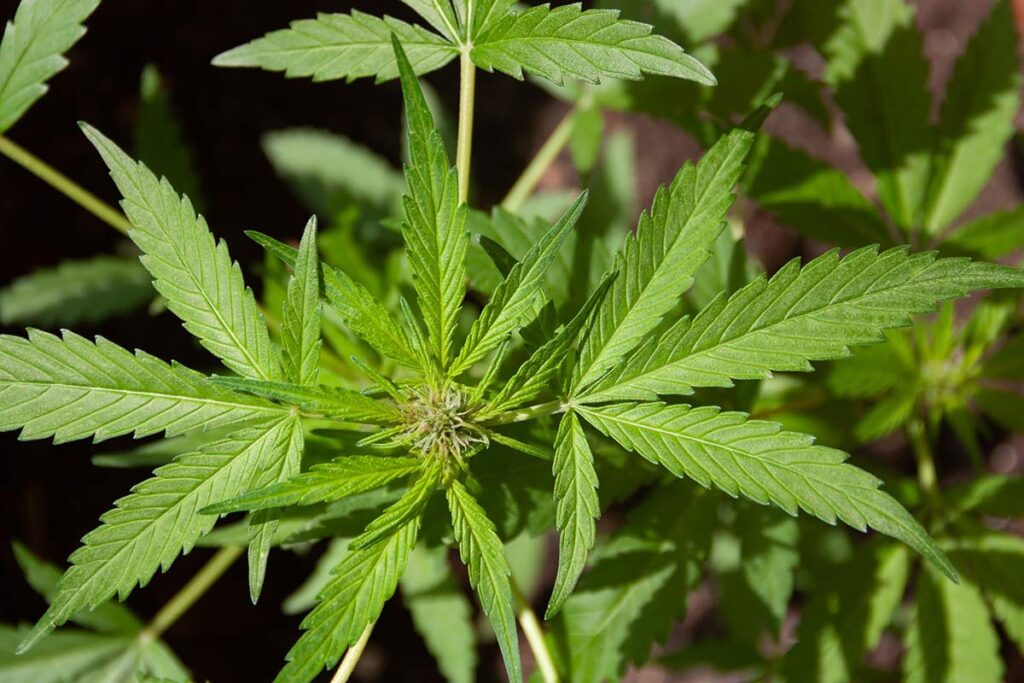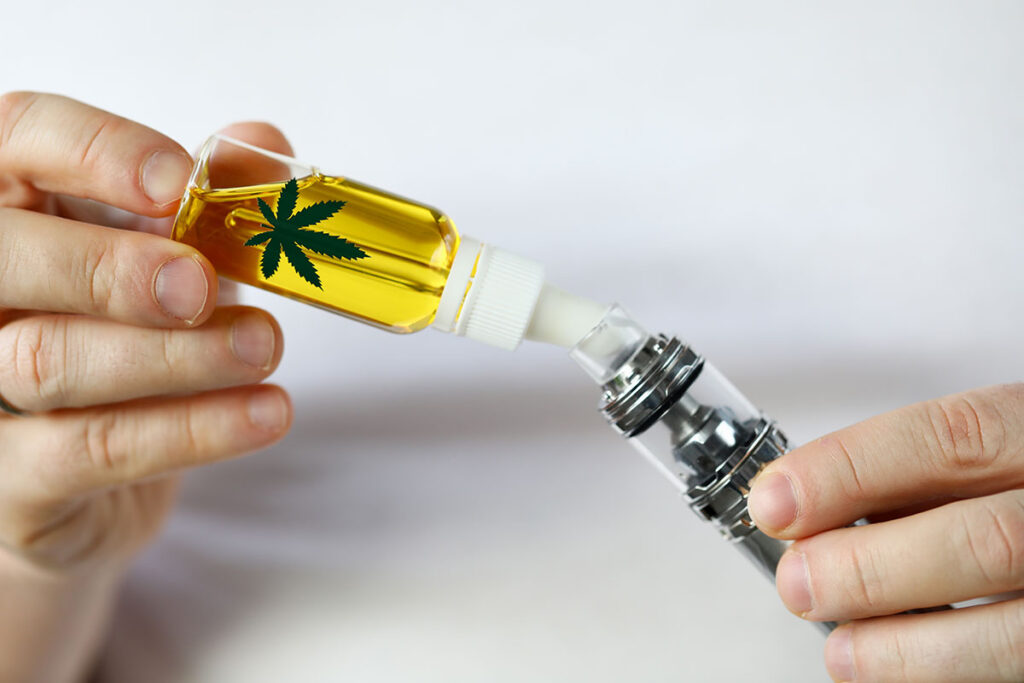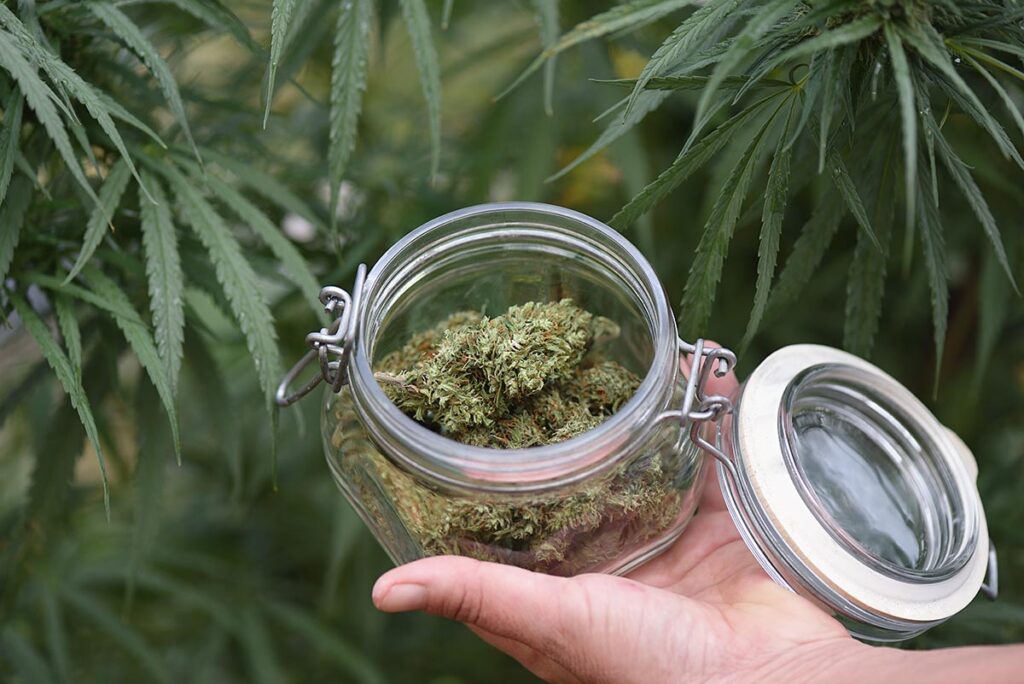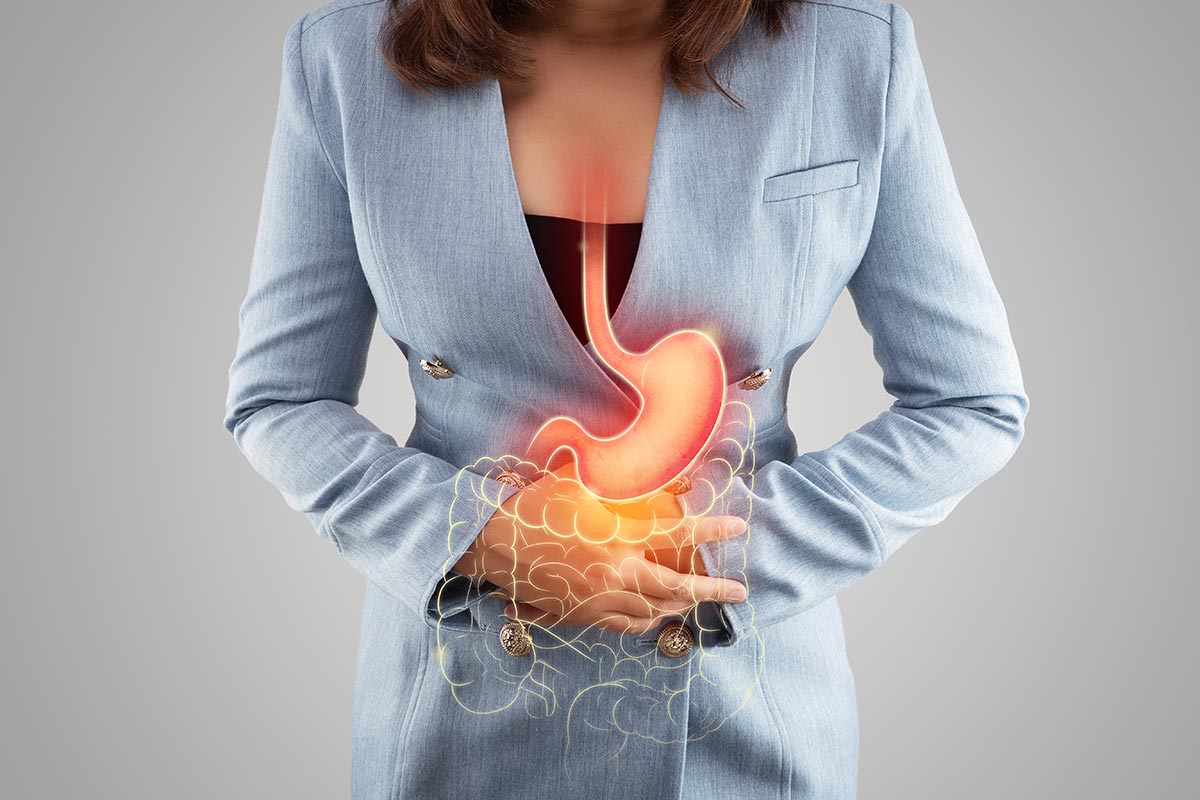Can CBD or medical cannabis help the symptoms of inflammatory bowel disease?
Use of cannabis and CBD amongst IBD sufferers is very common. Its many advocates say that it helps reduce pain, nausea, vomiting, diarrhea and cramping as well as reducing joint pain and stiffness.
But is there any solid scientific basis for these claims?
Curakind examines the evidence and gives you the facts you need to make an informed choice.
What is cannabis?
Cannabis is a plant that is found in many countries and regions across the world. What makes the cannabis sativa plant special is its tough fibrous body, traditionally used for ropes and materials; and its 500 different active ingredients, used for many centuries for medicinal and recreational purposes.
These active ingredients are called cannabinoid, flavonoids and terpenes. Whilst flavonoids and terpenes are both useful, modern medical research has been mainly based around cannabinoids.
What are cannabinoids, and what do they do?
Cannabinoids are a class of chemical compounds that interact with the body by mimicking naturally-occurring substances called endocannabinoids. These are part of a system that regulates many functions in the body. They cause cells in the brain and other organs to release natural substances with pain relieving properties, including neurotransmitters.
The majority of inflammatory bowel disease research has focused on two of these cannabinoids: THC and CBD.
- THC (Delta-9-tetrahydrocannabinol) is the most well-known cannabinoid. It is linked to decreased nausea and pain, increased appetite (the munchies), and psychological effects like relaxation, euphoria, and altered sensory perception, all of which make users feel high, stoned or “baked”.
THC is great for creativity and treating epilepsy, but has also been linked to anger, anxiety, and paranoia.
- CBD (Cannabidiol) does not induce intoxicating effects as it is non-psychotropic. Instead, it is responsible for the sedative effects that can occur when smoking or swallowing cannabis. CBD has been linked to a decrease in convulsions, nausea, and inflammation. It may also help to alleviate some of the adverse effects of THC.

How does it work?
Phytocannabinoids such as CBD have been shown to be a potent aid in improving general wellness in human bodies. This is because CBD boosts the endocannabinoid System (ECS) and causes it to work more efficiently.
What is the endocannabinoid system (ECS)?
The ECS is an essential modulatory system controlling things such as sleep, hormones, fertility, mood, pain response and anxiety.
It works through a lock and key system. The locks are the receptors CB1 and CB2, found throughout your body. Cannabinoids – either our body’s natural endocannabinoids, or external phytocannabinoids such as THC – bind to these neurons, unlocking them like a key.
We have two different types of receptors in our bodies:
- CB1 receptors, mainly in the central nervous system.
- CB2 receptors, which are found in the peripheral nervous system, particularly immune cells.
How does CBD interact with the ECS?
THC and CBD both interact with our ECS, but in very different ways. THC binds directly with our CB1 and 2 receptors, overwhelming the system and causing an instant strong effect.
CBD, on the other hand, does not bind directly with the receptors, but instead stimulates the system, making it more efficient. For this reason the effect of CBD is much more subtle and less disruptive to your body’s own processes.
What is IBD?
Inflammatory bowel disease (IBD) is an umbrella term used to describe disorders that involve chronic inflammation of the digestive tract. Types of IBD include:
- Ulcerative colitis. This condition involves mucosal inflammation and sores (ulcers) along the superficial lining of your large intestine (colon) and rectum.
- Crohn’s disease. This type of IBD is characterized by inflammation of the lining of the digestive tract, often involving the deeper layers of the tract.
IBD can be debilitating, and depending on disease severity (measured by the Crohn’s disease activity index), can lead to life-threatening problems.

What are IBD symptoms?
Symptoms differ depending on where the inflammation is and how severe it is. Whilst there are periods of remission, active illness symptoms include the following.
- Fatigue
- Abdominal pain and cramping
- Diarrhea
- Reduced appetite
- Blood in your stool
- Unintended weight loss
How does CBD work to treat inflammatory bowel disease?
One of the benefits medical marijuana and CBD offer are their anti-inflammatory properties, which can have a soothing effect on your gut.
In addition, CBD inhibits immune cells from invading colon tissue and lowers inflammation levels throughout the gastrointestinal tract. These effects work together to inhibit the damage caused to intestinal tissues.
As well as offering symptom relief from IBDs such as ulcerative colitis and Crohn’s disease, CBD can be an effective treatment for a variety of other conditions affecting your digestive system. These include irritable bowel syndrome (IBS), gastritis, heartburn and constipation.
Current IBD therapies and their effects
The goal of IBD treatment is to reduce inflammation. The two options are either drugs or surgical intervention. Common treatments include:
Anti-inflammatory drugs
Corticosteroids and aminosalicylates are often used to treat the symptoms of inflammatory bowel diseases, particularly active ulcerative colitis and Crohn’s disease.
Immune system suppressors
These drugs work in different ways to stop the immune system from releasing inflammation-inducing chemicals that can damage the digestive tract.
Immunosuppressant drugs such as azathioprine, mercaptopurine and methotrexate are used to treat the symptoms of intestinal inflammation.
Biologics
Biologics are treatments that neutralize proteins in the body by means of intravenous (IV) infusion or injections.
Examples include infliximab (Remicade)and adalimumab (Humira). Ustekinumab (Stelara) is a newer treatment for inflammatory bowel disease including ulcerative colitis and Crohn’s disorder.
Antibiotics
Additional drugs can be used with antibiotics or when infection is problematic. With perianal Crohn’s, for example, ciprofloxacin (Cipro) and metronidazole (Flagyl) are common prescriptions.

Tips for living with IBD or Crohn’s Disease
One of the hardest things about dealing with this disease is that there are no known cures and the symptoms can be completely debilitating.
As you are living with IBD, it is important to remember that it is not just about the active disease. There are new ways of managing it and there are new treatments on the horizon. You need to maintain good nutrition and work on your mental health to reduce risk of relapse.
The most important factor in your ability to recover is compliance with treatment regimens, so follow up with your doctor for regular check-ups and always consult them if you have any concerns. It is also important to keep up with healthy habits. Maintain a regular sleep pattern, eat nutritious foods (including dietary supplements if necessary), and practice mindfulness or meditation, as well as taking short baths or showers instead of soaking in them etc.
These habits will contribute both towards inflammation reduction and away from mood degradation. It is easy to get overwhelmed by this disease. Tackling one area at a time and staying as healthy as possible will help you deal with it.
In addition to these general tips for living with an inflammatory bowel condition, there are also some more specific dietary steps that can be taken to manage IBD symptoms including CBD use. When it comes down to what foods people should eat during flare-ups of ulcerative colitis or Crohn’s Disease , the key is avoiding any food that causes inflammation. That means sticking mainly (or only) to things like lean proteins (turkey breast, fish), vegetables without seeds (broccoli, cauliflower), fruit juices/smoothies free from added sugar (apple juice, blueberries), and healthy fats (avocado, almonds).
Studies into CBD and IBD
As well as the anecdotal reports, there have been several studies and clinical trials investigating the use of CBD oil and medical marijuana for IBD.
As early as 2010 an investigation into the effects of THC and CBD on in vitro motility disturbances in rat colitis concluded that THC and CBD not only reduced inflammation, but also reduced functional disturbances.
A prospective placebo-controlled study in 2013 found that medical cannabis induced a clinical response in patients with Crohn’s disease when added to regular treatments. Of the 21 patients who had not responded to traditional treatments, five achieved complete remission of symptoms and eight others saw a marked improvement in their disease activity.
Patients using THC also reported a significant improvement in appetite and sleep compared with the placebo group.
Most recently, a 2018 review of several randomised controlled studies concluded that full spectrum CBD oil did indeed ease some Crohn’s disease symptoms and increased quality of life.
More clinical studies are needed but these few results seem to show that medical cannabis and CBD both have a place in treating IBD.
How do I take CBD for inflammatory bowel disease?
There are different ways to take CBD oil for IBD.
Here are the most common:

CBD oils and tinctures
CBD oils are a mixture of CBD distillate, mixed into a carrier oil such as hemp oil, olive oil or coconut (MCT) oil. They come in a variety of strengths, starting at about 2% and going up to 30%.
They usually come in dropper bottles that allow accurate doses. To use, apply the oil sublingually (under the tongue) and hold it in the mouth for as long as possible. This means the oil is absorbed by the mucous membranes and enters directly into the bloodstream, bypassing the digestive system.
CBD taken this way stays in the system about 6-8 hours. To help control IBS symptoms, take it three times a day, at breakfast, lunchtime and before going to bed.
If you decide to start using CBD oil for IBD, it is always best to start with a low dose and work up. After trying the oil, if you feel good and have no side effects then increase the dosage by 25% every week or so until you find what is best for you.
Vaping or smoking CBD
You can also vape CBD if you find it more effective. The advantage of vaping is its quick absorption into the body, most people feel an effect within a couple of minutes. It also bypasses the digestive system.
Edibles
Another option for taking CBD oil for IBD is to eat an edible. Edibles can be delicious snacks made at home or gummy bears bought from a shop. The disadvantage is that CBD taken in an edible needs to pass through the digestive system. This process is slow and the effects can take up to two hours to be felt.
Pills and capsules:
Pills and capsules are another option for taking CBD oil for IBD. They allow you to get your daily dose of cannabinoids without any mess or fuss. Doses are measured and convenient. As above, the disadvantage is that they need to pass through the digestive system and absorption is therefore slow.
Types of CBD for IBD
Full Spectrum CBD
Full Spectrum CBD is CBD oil that contains the full range of cannabinoids and terpenes naturally found in Cannabis plants. These cannabinoids and terpenes include CBD, CBG, CBC, THCV, CBN, all of which are now being researched and found to have their own unique properties.
Broad Spectrum CBD
Like full spectrum oil, broad spectrum CBD contains most of the cannabinoids, flavonoids and terpenes present in the cannabis plant it was extracted from, with two important exceptions. It contains almost no THC or CBN (the cannabinoid that THC breaks down into with age). This makes it ideal for people looking for the entourage effect of cannabis, but who are maybe sensitive to THC, even in very low quantities.
CBD isolate
CBD isolate is just pure CBD that has been extracted from hemp and contains no other cannabinoids.
It can be a solid or powder which can be used as a food supplement or taken as a pill.
It may be the best option to use if you are interested in treating IBS symptoms with cannabis but do not want any of the effects associated with THC or other cannabinoids. It’s also easy to adjust dosage, making it easier to experiment until you find what works best for your body.
Medical cannabis
In many parts of the world cannabis, whether medical or not, is illegal, and much has been written about the effects of chronic cannabis abuse by teenagers etc, with some evidence that cannabis induces psychosis amongst vulnerable people.
Despite this, high THC cannabis has been shown to be useful in treating many issues including chronic pain, epilepsy and multiple sclerosis.
Many IBD sufferers claim that high THC cannabis use is more effective than CBD, and there is some evidence to support this but data collection is sparse due to THCs complicated legal status.
If you are fortunate enough to live in a place where medical and recreational marijuana are available without legal issues, this might be worth discussing with somebody who can provide medical advice about the pros and cons of medical marijuana.

Side effects of CBD
Unlike THC, CBD has few side effects for most adults. Possible side effects include:
- fatigue
- irritability
- changes in appetite
- nausea
- changes in weight
It is important to note that it can also interact with some prescription medications, such as blood pressure medications and those that carry a “grapefruit warning”. For this reason it is always a good idea to consult with a medical professional if you are thinking about adding medical cannabis or CBD to your regime.
Common misconceptions about CBD
One of the most common misconceptions about CBD oil is that it will get you high or leave you feeling either sleepy or lazy. It is important to note that CBD is non-psychoactive and will not make you high.
As far as feeling lazy, many people use CBD for insomnia and it is true that it can make some people feel sleepy. The way to combat this is to start with a low dose, and if you feel sleepy, reduce it.
The best treatment for inflammatory bowel diseases can be a combination of medication as well as lifestyle changes such as diet modification.
These lifestyle changes also include stress management techniques which have been shown to improve intestinal health in people who suffer from Crohn’s disease or ulcerative colitis.
Adverse events in IBD therapies
Adverse events are common in IBD therapy. Usually, these are transitory and do not require drug discontinuation.
In the pharmacologic management of IBD, one should consider that there is no perfect drug for all patients. Treatment response and adverse events depend on many factors such as severity and duration of the patient’s condition, previous treatment history, comorbidities (such as metabolic syndrome), and genetics (pharmacogenomics).
It is important to remember that every inflammatory bowel disease medication has its own set of potential side effects; some are serious adverse events that can be life threatening. For this reason it is always recommended to monitor your health regularly with blood tests even if you feel healthy at a given moment to pick up early signs.
Conclusion
Inflammatory bowel diseases are a debilitating condition that can cause pain, malnutrition and even death. But relief may be on the horizon in the form of CBD oil. More clinical trials are needed but initial studies seem to suggest that both CBD and cannabis use could offer significant benefits for IBD patients by reducing symptoms such as inflammation, easing anxiety and depression, controlling diarrhea and nausea and improving sleep quality.
Have any of our readers tried CBD? How did it work out? Share your thoughts below!
READ MORE
CBD for GORD, acid reflux and heartburn







